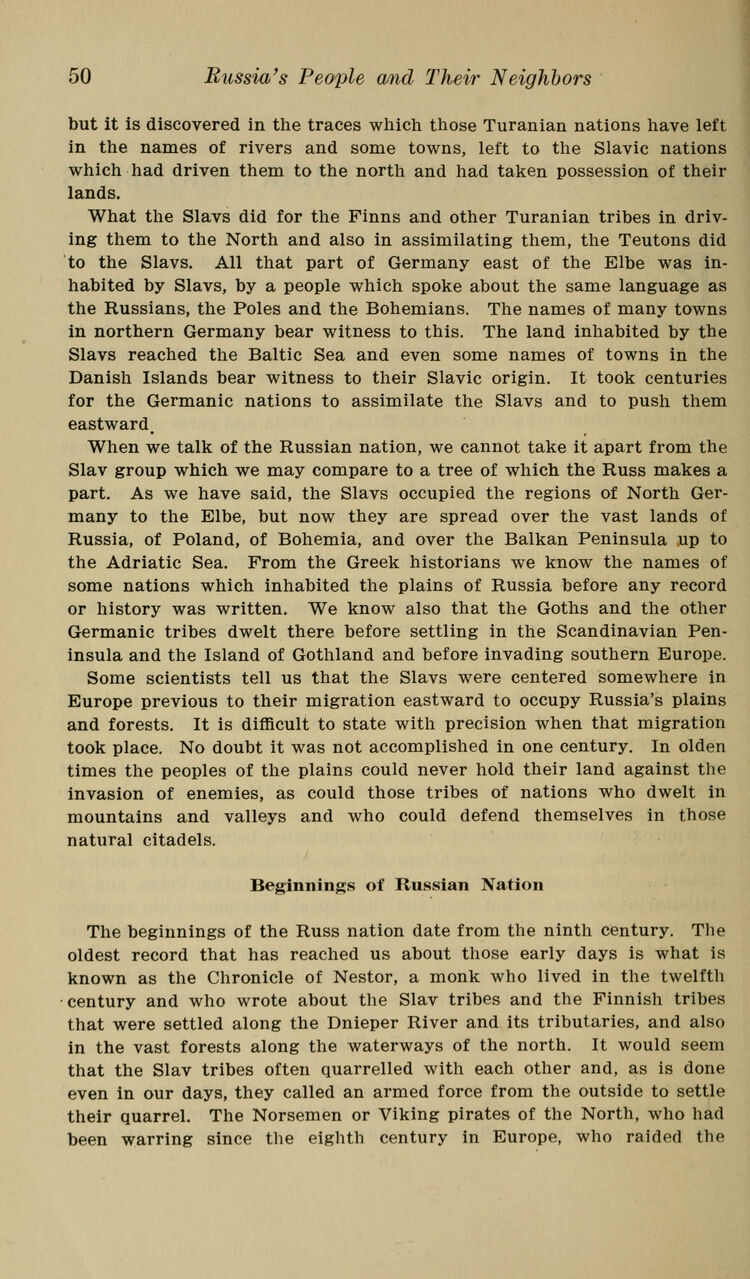
Full resolution (JPEG) - On this page / på denna sida - Russia’s People and Their Neighbors. Prof. Michael A. de Sherbinin - The Early History - Beginnings of Russian Nation

<< prev. page << föreg. sida << >> nästa sida >> next page >>
Below is the raw OCR text
from the above scanned image.
Do you see an error? Proofread the page now!
Här nedan syns maskintolkade texten från faksimilbilden ovan.
Ser du något fel? Korrekturläs sidan nu!
This page has never been proofread. / Denna sida har aldrig korrekturlästs.
50 Russia’s People and Their Neighbors
but it is discovered in the traces wliich those Turanian nations have left
in the names of rivers and some towns, left to the Slavic nations
which had driven them to the north and had taken possession of their
lands.
What the Slavs did for the Finns and other Turanian tribes in driv-
ing them to the North and also in assimilating them, the Teutons did
to the Slavs. All that part of Germany east of the Elbe was in-
habited by Slavs, by a people which spoke about the same language as
the Russians, the Poles and the Bohemians. The names of many towns
in northern Germany bear witness to this. The land inhabited by the
Slavs reached the Baltic Sea and even some names of towns in the
Danish Islands bear witness to their Slavic origin. It took centuries
for the Germanic nations to assimilate the Slavs and to push them
eastward.
When we talk of the Russian nation, we cannot take it apart from the
Slav group which we may compare to a tree of which the Russ makes a
part. As we have said, the Slavs occupied the regions of North Ger-
many to the Elbe, but now they are spread over the vast lands of
Russia, of Poland, of Bohemia, and over the Balkan Peninsula up to
the Adriatic Sea. From the Greek historians we know the names of
some nations which inhabited the plains of Russia before any record
or history was written. We know also that the Goths and the other
Germanic tribes dwelt there before settling in the Scandinavian Pen-
insula and the Island of Gothland and before invading southern Europe.
Some scientists tell us that the Slavs were centered somewhere in
Europe previous to their migration eastward to occupy Russia’s plains
and forests. It is difficult to state with precision when that migration
took place. No doubt it was not accomplished in one century. In olden
times the peoples of the plains could never hold their land against the
invasion of enemies, as could those tribes of nations who dwelt in
mountains and valleys and who could defend themselves in those
natural citadels.
Beginnings of Russian Nation
The beginnings of the Russ nation date from the ninth century. The
oldest record that has reached us about those early days is what is
known as the Chronicle of Nestor, a monk who lived in the twelfth
century and who wrote about the Slav tribes and the Finnish tribes
that were settled along the Dnieper River and its tributaries, and also
in the vast forests along the waterways of the north. It would seem
that the Slav tribes often quarrelled with each other and, as is done
even in our days, they called an armed force from the outside to settle
their quarrel. The Norsemen or Viking pirates of the North, who had
been warring since the eighth century in Europe, who raided the
<< prev. page << föreg. sida << >> nästa sida >> next page >>